Existing User Log In
New User Registration
Register for a free account to gain full access to the VGChartz Network and join our thriving community.



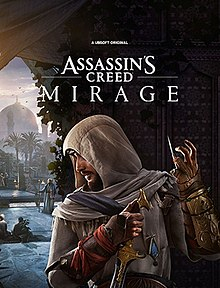

America - Front
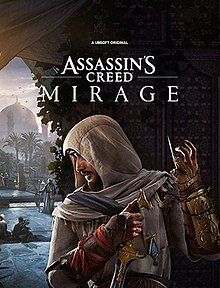

America - Back

Ubisoft
Action-Adventure
 (Add Date)
(Add Date) (Add Date)
(Add Date) (Add Date)
(Add Date)
| Owners: | 0 |
| Favorite: | 0 |
| Tracked: | 0 |
| Wishlist: | 0 |
| Now Playing: | 0 |
Ubisoft’s historical fiction epic, Assassin’s Creed, has seen a slew of themes, premises, and gameplay concepts across its rich 15-year run. In a sense, the latest entry is a culmination of these approaches, cobbled together in a stealth-based action game that sometimes succeeds, and sometimes, well — not so much. Assassin’s Creed Mirage feels Valhalla-esque in its mechanics and grandiosity, yet greatly dials back the RPG upgrades and stresses more covert gameplay ala classic Creed. It maintains a rich, dynamic open world — mostly residing in a bustling Baghdad circa the 800s. Yet it distills the content compared to the ARPG trilogy preceding it, almost to a fault. This mix of elements from prior AC eras makes for a mixed bag regarding the gameplay. Parts of its restructured, integrated campaign stand out, along with a few satisfying combat tools and some gorgeous, lively locales. As a complete, authentic AC experience, though, Mirage falls a bit short.
Roaming the vast, bustling city of ninth-century Baghdad as street thief-turned-assassin Basim, it soon becomes apparent that Ubisoft was looking to tap back into classic Creed elements. However, this notion that the game “returns to the series’ roots” tends to be overstated. The bulk of Mirage’s setting resides in Baghdad’s sprawling city streets, which means you’ll spend ample time stealth-killing and eluding countless troop patrols scattered about in varying ways. This more classic design also incentivizes traipsing and hopping across rooftops, creeping through bushes and behind walls, scouting regions with your bird Enkidu, and using other covert means more often than not. These methods include tools like Smoke Bombs, which are deployed as an effective way to hide and yield easy assassinations in a heated fight. Stealthy moves like this are useful, as Basim can often be overpowered by foes fairly quickly.
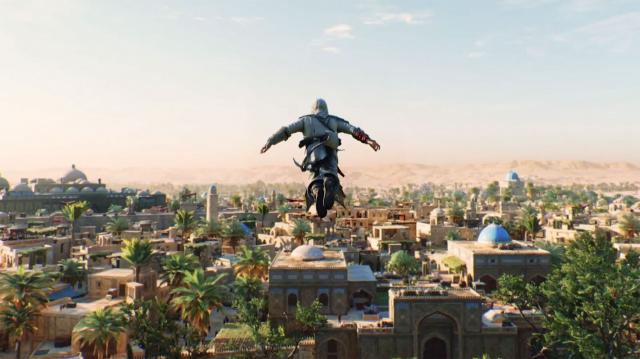
Shades of AC nostalgia also crop up with features like the notoriety system, which has you spending some idle time tearing down wanted posters of your likeness on buildings, or bribing “Munadis” bringing townspeople to your attention via "Power Tokens". These actions are a simple yet satisfying way to temper hostile NPCs, whose distaste for you grows in various ways. These include killing guards in plain sight or getting caught pickpocketing (an amusing addition to the game), which gives you quick access to tokens and other goodies. Wiping your notoriety can seem mundane and tedious after a while, though staying on top of this proves important early on. That’s because it’s quite easy to aggro large sections of the town — even despite some rather dimwitted AI — as busier areas are often crawling with guards.
Mirage stresses other non-combative options to make headway and avoid trouble, often bringing flexibility and freedom in actions to achieve the same ends. You may, for instance, find it useful to blend in with a crowd to sneak into a heavily guarded fortress. You can sit on a bench to evade unwanted attention. And it should be noted that these features actually feel useful again, unlike in the action-heavy Valhalla. In addition, you can pretend to be part of a gear-lugging merchant group to access restricted places without confrontation, or give a token to musicians to distract guards with a jaunty tune. Or, if you’re coming off Valhalla and want to channel some of those Viking impulses, you can pay Mercenaries with a certain token to charge into some areas and aid you in a tough skirmish.
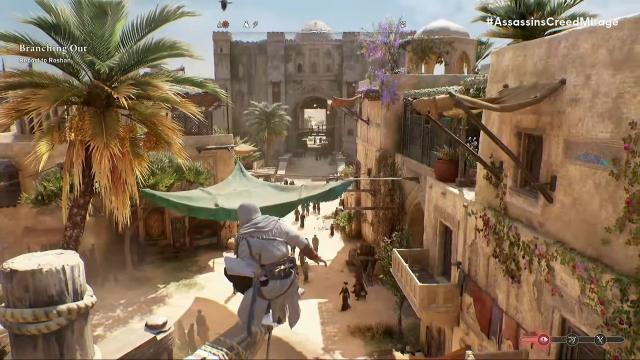
Particularly in busy city sections, Ubisoft incentivizes the familiar covert, stealth-based gameplay, rather than coming out swinging each time. You’ll often want to survey the environment and adapt to the situation, rather than hack your way through 27 aggressive troops with your sword. Ubisoft drives this point home by stripping away many upgrade options found in recent AC titles — namely by wiping the leveling system and cutting back the Skill Tree. The ability to power through with pure might and muscle is restricted almost to a fault. This can be frustrating to fans of recent AC games like myself, yet it also adds some excitement and intensity, while forcing you to be more cunning.
Still, given that Mirage got its start as a Valhalla expansion before becoming a standalone game, it makes sense that it does hold some undertones of the ARPG trilogy, especially the Viking-based sequel, for better or worse. This really becomes apparent when venturing beyond the mega-city and getting a change of pace within the gorgeous wilderness biome — where the dynamic visuals (courtesy of Series X in my case) truly shine. It was a sight to behold gazing upon the vibrant rays of a warm sunset gleaming through the palm trees, dancing on the blue oasis waters, and illuminating clouds of sand as I traversed the desert on my trusty camel. Coming more from the Origins trilogy school of AC, I enjoyed these more epic, open-world bouts, which felt far more “next-gen” as opposed to the "classic-style" tag this Creed installment is given.
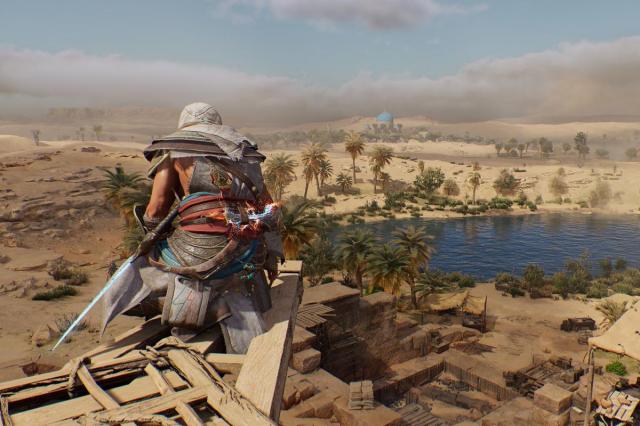
Mirage’s awkward, clunky combat, on the other hand, is a facet of Valhalla I largely could have done without — and unfortunately it does largely draw from Valhalla's combat. Basim’s offensive tools are quite lacking, at least for about the first third of the campaign, which only further highlights these spotty mechanics. This might be fine if Ubisoft returned to the swifter, free-flowing combat of Creed’s yesteryear, but instead, fighting can devolve into clumsy, repetitive bouts of swords clashing. Basic attacks boil down to a light and heavy strike, the latter of which can be tough to successfully pull off unscathed.
And though finishers and assassinations can be fun to watch, this is tempered by other foes hitting you while executing these moves, as Basim remains vulnerable during the animations. This has brought me perilously close to death and even ended me a few times. But while Valhalla’s Eivor had a slew of skills and abilities to offset some of these quirks, Basim is often left without many options, especially when the stamina bar is depleted. You’ll often have to dodge, parry, or respond to a foe’s sporadic swings or thrusts with a counter-attack — which is an insta-kill but is tricky to time properly.
Combat does get more favorable and fun when you start building up a handful of upgradable tools several hours in. These range from throwable knives — a weak substitute for a bow — to amusing blow darts and traps that can hinder foes and enable assassinations. Added to this is a new feature; a rare offensive move called Focus, which allows you to freeze the action and swiftly neutralize several targets at once. This useful move is satisfying to pull off, though you can’t be detected for it to work. Stringing together these different tools and abilities is a blast, and brings back some of the quicker, flashier vibe of classic Creed. It's just unfortunate that these abilities and Houdini-type moves are few and far between.
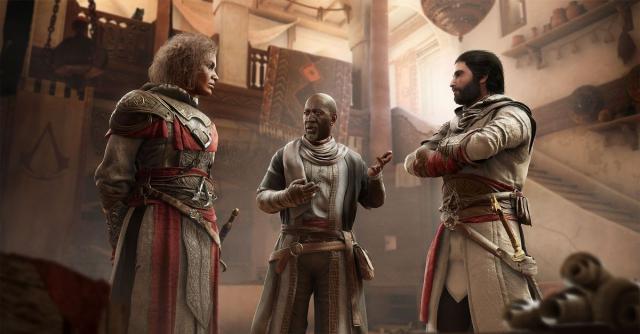
The reworked skill tree is far easier to absorb than the endless branches of the ARPGs preceding Mirage. While this allows you to refine and focus your build more efficiently, it also lacks the impact of those in prior entries. Many of these skills feel inconsequential, as they rely on marginal upgrades like pickpocket upgrades or more features for your bird. There are some helpful options like a chain assassination and additional tool unlocks, but again, they’re rare.
The game’s content and campaign are similarly whittled down, which in this case is a refreshing change of pace from the 80-hour marathons of Odyssey and Valhalla. The core game can be tackled in well under 20 hours, with the smattering of extras adding about 10 more. This more digestible campaign — balanced by the rich, grandiose landscapes — rounds out an appealing experience despite some shortfalls. In a departure from basic quest checklists, Mirage opts for a distinct web of interconnecting nodes; not unlike Valhalla’s Order of the Ancient’s menu layout, just applied to quest beats. This largely non-linear system allows you to wander about the busy town and tackle objectives at your own pace, bringing a more organic sensibility without feeling overwhelming.
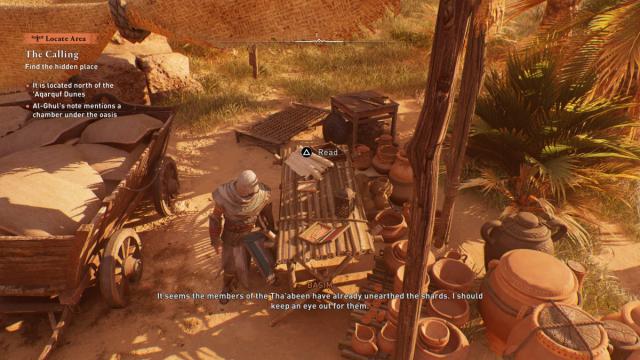
This format can be a culture shock at first glance and comes off as needlessly convoluted. Yet the more you progress, things will figuratively and literally come into focus, as one node’s completion will unveil another connected to it, often with a set of clues to discover. These tasks often boil down to aiding citizens, infiltrating an area, or targeting members of The Order — and sometimes grant only vague details as to their location. You may have to read pamphlets, tail someone, or eavesdrop on a discussion to get more clues or complete a task. Progression leads Basim to increasingly prominent Order members, and fills in some interesting lore along the way. As waypoints may or may not be given, there were frustrating moments of ambiguity as I sometimes found myself on a wild goose chase to find the next “thing” to do. There were times I struggled to find a particular location, or locate a prisoner I had to free in the bowels of a dungeon while trying to evade many guards.
For the most part, I found myself enjoying the revamped campaign and quasi-investigative stealth gameplay. It brought a more nuanced vibe akin to a medieval detective, uncovering details and tackling covert missions, all escalating to a thrilling finale — as opposed to just slaying all in my wake like a brute as I traversed an entire country. Other areas of progression and customization are dialed back, but more to Mirage’s detriment. Most notable is the scarce supply of weapons and gear, which streamlines (but also waters down) upgrades and customization moreso even than Valhalla. These items are also laced with the annoying requirement of a given schematic for each piece — often cryptically hidden in a gear chest — to upgrade it.
Then there’s the addition of tokens, which prove vital in various ways, at least if you want to avoid more conflict. There are a handful of sidequests, in the form of rewarding Contracts and Tales of Baghdad, which bring some added character to the otherwise one-dimensional NPCs. Fast travel viewpoints make a return here, but as your ability to climb anything has been hindered, these can be more irritating than exhilarating. Various trinkets can be found and pickpocketed from oblivious NPCs and pawned for wealth. Finally, a few more notable collectibles, like Mysterious Shards, can be gathered and turned in for new gear and other goodies.

Beyond these elements, there's little added incentive to explore the world in depth, so those who favor the ARPG epics may find Mirage lacking in terms of content or extras. As a whole, I did appreciate the refreshing change of pace from the more focused AC experience. After all, I have spent several dozens of hours collectively on the last three entries, with quite a few stones left unturned. Mirage allows you to get fully immersed in its rich campaign, soaking in the bulk of the game without dedicating several weeks. I do wish there was more in the way of useful upgrades or rewards, especially when performing flashier kills and assassinations. As it stands, these feats feel more insignificant in Mirage, outside of being stepping stones for reaching the next milestone.
Ubisoft clearly tried to dial things back to appease fans of classic AC, with game design that compels actions more akin to an actual assassin, rather than a Viking or Spartan superhuman. But players looking for a true return to form may be disappointed, as Mirage stresses weightier combat and movement, as well as a relative lack of linearity. At the same time, progression elements of the ARPGs are throttled back, often dampening the experience and lessening those rewarding moments. This attempt to “meet in the middle” between styles, while it should appeal to a wider range of fans, doesn’t really excel in the realms of stealth or ARPG. The result is a fairly average action-adventure with glimpses of greatness, but which lacks cohesion and doesn’t quite rise to its potential.









